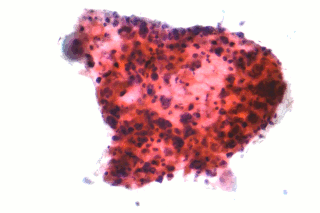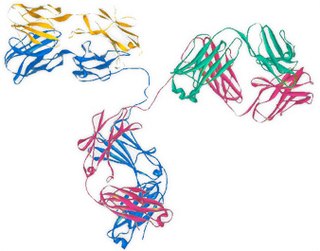
Non-small-cell lung cancer (NSCLC), or non-small-cell lung carcinoma, is any type of epithelial lung cancer other than small-cell lung cancer (SCLC). NSCLC accounts for about 85% of all lung cancers. As a class, NSCLCs are relatively insensitive to chemotherapy, compared to small-cell carcinoma. When possible, they are primarily treated by surgical resection with curative intent, although chemotherapy has been used increasingly both preoperatively and postoperatively.

Abagovomab is a mouse anti-idiotype monoclonal antibody whose variable epitope mirrors a tumour antigen (CA-125) highly expressed in the epithelial ovarian cancer. Abagovomab does not bind directly to CA-125, but it works as a "surrogate" antigen, enabling the immune system to identify and attack tumour cells displaying the CA-125 protein. Through this, it is hoped that the body's immune system may be able to combat any remaining individual tumour cells and thus prevent recurrence of the disease.

Mesothelin, also known as MSLN, is a protein that in humans is encoded by the MSLN gene.

Protein tyrosine phosphatase type IVA 3 is an enzyme that in humans is encoded by the PTP4A3 gene.
A vascular-targeting agent (VTA) or vascular disrupting agent (VDA) is a drug designed to damage the vasculature of cancer tumors causing central necrosis.

Combined small cell lung carcinoma is a form of multiphasic lung cancer that is diagnosed by a pathologist when a malignant tumor, arising from transformed cells originating in lung tissue, contains a component of small cell lung carcinoma (SCLC) mixed with one or more components of any histological variant of non-small cell lung carcinoma (NSCLC) in any relative proportion.
Targeted therapy of lung cancer refers to using agents specifically designed to selectively target molecular pathways responsible for, or that substantially drive, the malignant phenotype of lung cancer cells, and as a consequence of this (relative) selectivity, cause fewer toxic effects on normal cells.
Pelareorep is a proprietary isolate of the unmodified human reovirus being developed as a systemically administered immuno-oncological viral agent for the treatment of solid tumors and hematological malignancies. Pelareorep is an oncolytic virus, which means that it preferentially lyses cancer cells. Pelareorep also promotes an inflamed tumor phenotype through innate and adaptive immune responses. Preliminary clinical trials indicate that it may have anti-cancer effects across a variety of cancer types when administered alone and in combination with other cancer therapies.
Angiokinase inhibitors are a new therapeutic target for the management of cancer. They inhibit tumour angiogenesis, one of the key processes leading to invasion and metastasis of solid tumours, by targeting receptor tyrosine kinases. Examples include nintedanib, afatinib and motesanib.
Urelumab is a fully human, non‐ligand binding, CD137 agonist immunoglobulin‐γ 4 (IgG4) monoclonal antibody. It was developed utilizing Medarex's UltiMAb(R) technology by Bristol-Myers Squibb for the treatment of cancer and solid tumors. Urelumab promotes anti-tumor immunity, or an immune response against tumor cells, via CD137 activation. The application of Urelumab has been limited because it can cause severe liver toxicity.

Pegdinetanib is an investigational anti-cancer drug that acts as a selective antagonist of vascular endothelial growth factor receptor 2 (VEGFR-2), hindering vascularization of tumors. It is a genetically engineered peptide derivative based on the monobody technology, and is being developed by Adnexus.
Targeted molecular therapy for neuroblastoma involves treatment aimed at molecular targets that have a unique expression in this form of cancer. Neuroblastoma, the second most common pediatric malignant tumor, often involves treatment through intensive chemotherapy. A number of molecular targets have been identified for the treatment of high-risk forms of this disease. Aiming treatment in this way provides a more selective way to treat the disease, decreasing the risk for toxicities that are associated with the typical treatment regimen. Treatment using these targets can supplement or replace some of the intensive chemotherapy that is used for neuroblastoma. These molecular targets of this disease include GD2, ALK, and CD133. GD2 is a target of immunotherapy, and is the most fully developed of these treatment methods, but is also associated with toxicities. ALK has more recently been discovered, and drugs in development for this target are proving to be successful in neuroblastoma treatment. The role of CD133 in neuroblastoma has also been more recently discovered and is an effective target for treatment of this disease.
A MEK inhibitor is a chemical or drug that inhibits the mitogen-activated protein kinase kinase enzymes MEK1 and/or MEK2. They can be used to affect the MAPK/ERK pathway which is often overactive in some cancers.

Squamous-cell carcinoma (SCC) of the lung is a histologic type of non-small-cell lung carcinoma (NSCLC). It is the second most prevalent type of lung cancer after lung adenocarcinoma and it originates in the bronchi. Its tumor cells are characterized by a squamous appearance, similar to the one observed in epidermal cells. Squamous-cell carcinoma of the lung is strongly associated with tobacco smoking, more than any other forms of NSCLC.

Src inhibitor is a class of inhibitors that targets the Src kinase family of tyrosine kinase, which is transcribed by the Src proto-oncogene that potentially induce malignant transformations of certain cells. Because of the crucial position of the Src kinase in cells, Src inhibitors are potential antineoplastic agents for e.g. pancreatic cancer, breast cancer and stomach cancer

Pevonedistat (MLN4924) is a selective NEDD8 inhibitor. It is being investigated as a cancer treatment, e.g. for mantle cell lymphoma (MCL).

Tesevatinib is an experimental drug proposed for use in kidney cancer and polycystic kidney disease. The drug was first developed by Exelixis, Inc. and was later acquired by Kadmon Corporation. Tesevatinib binds to and inhibits several tyrosine receptor kinases that play major roles in tumor cell proliferation and tumor vascularization, including epidermal growth factor receptor, epidermal growth factor receptor 2, vascular endothelial growth factor receptor (VEGFR), and ephrin B4 (EphB4).

Ipatasertib (RG7440) is an experimental cancer drug in development by Roche. It is a small molecule inhibitor of AKT, which is a key component of the PI3K/AKT pathway. Ipatasertib was discovered by Genentech in collaboration with Array Biopharma and is currently in phase III trials for treatment of breast cancer.
The host response to cancer therapy is defined as a physiological response of the non-malignant cells of the body to a specific cancer therapy. The response is therapy-specific, occurring independently of cancer type or stage.
Peter Edward Fecci is an American neurosurgeon, professor and researcher. He is an Associate Professor of Neurosurgery, Pathology and Immunology at Duke University School of Medicine. He also serves as Director of the Duke Center for Brain and Spine Metastasis, Director of the Brain Tumor Immunotherapy Program, Residency Program Director, and Associate Deputy Director of the Preston Robert Tisch Brain Tumor Center at Duke.











